Related Research Articles

Kamila Shamsie FRSL is a Pakistani and British writer and novelist who is best known for her award-winning novel Home Fire (2017). Named on Granta magazine's list of 20 best young British writers, Shamsie has been described by The New Indian Express as "a novelist to reckon with and to look forward to." She also writes for publications including The Guardian, New Statesman, Index on Censorship and Prospect, and broadcasts on radio.

Miriam Toews is a Canadian writer and author of nine books, including A Complicated Kindness (2004), All My Puny Sorrows (2014), and Women Talking (2018). She has won a number of literary prizes including the Governor General's Award for Fiction and the Writers' Trust Engel/Findley Award for her body of work. Toews is also a three-time finalist for the Scotiabank Giller Prize and a two-time winner of the Rogers Writers' Trust Fiction Prize.

Andrew O'Hagan is a Scottish novelist and non-fiction author. Three of his novels have been nominated for the Booker Prize and he has won several awards, including the Los Angeles Times Book Award.
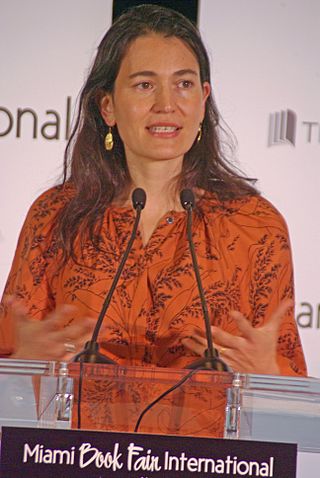
Nicole Krauss is an American author best known for her four novels Man Walks into a Room (2002), The History of Love (2005), Great House (2010) and Forest Dark (2017), which have been translated into 35 languages. Her fiction has been published in The New Yorker, Harper's, Esquire, and Granta's Best American Novelists Under 40, and has been collected in Best American Short Stories 2003, Best American Short Stories 2008 and Best American Short Stories 2019. In 2011, Nicole Krauss won an award from the Anisfield-Wolf Book Awards for Great House. A collection of her short stories, To Be a Man, was published in 2020 and won the Wingate Literary Prize in 2022.

Madeleine Thien is a Canadian short story writer and novelist. The Oxford Handbook of Canadian Literature has considered her work as reflecting the increasingly trans-cultural nature of Canadian literature, exploring art, expression and politics inside Cambodia and China, as well as within diasporic East Asian communities. Thien's critically acclaimed novel, Do Not Say We Have Nothing, won the 2016 Governor General's Award for English-language fiction, the Scotiabank Giller Prize, and the Edward Stanford Travel Writing Awards for Fiction. It was shortlisted for the 2016 Man Booker Prize, the 2017 Baileys Women's Prize for Fiction, and the 2017 Rathbones Folio Prize. Her books have been translated into more than 25 languages.

Lavinia Elaine Greenlaw is an English poet, novelist and non-fiction writer. She won the Prix du Premier Roman with her first novel and her poetry has been shortlisted for awards that include the T. S. Eliot Prize, Forward Prize and Whitbread Poetry Prize. She was shortlisted for the 2014 Costa Poetry Award for A Double Sorrow: A Version of Troilus and Criseyde. Greenlaw currently holds the post of Professor of Creative Writing (Poetry) at Royal Holloway, University of London.
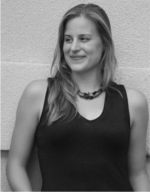
Lauren Groff is an American novelist and short story writer. She has written five novels and two short story collections, including Fates and Furies (2015), Florida (2018), Matrix (2022), and The Vaster Wilds (2023).
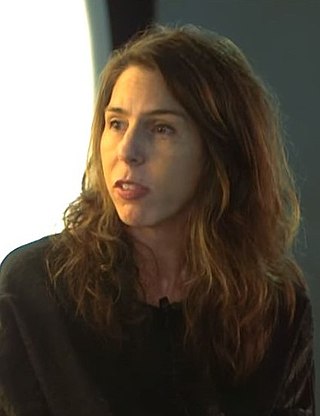
Rachel Kushner is an American writer, known for her novels Telex from Cuba (2008), The Flamethrowers (2013), and The Mars Room (2018).

Maaza Mengiste is an Ethiopian-American writer. Her novels include Beneath the Lion's Gaze (2010) and The Shadow King (2019), which was shortlisted for the 2020 Booker Prize.
The Goldsmiths Prize is a British literary award, founded in 2013 by Goldsmiths, University of London, in association with the New Statesman. It is awarded annually to a piece of fiction that "breaks the mould or extends the possibilities of the novel form." It is limited to citizens and residents of the United Kingdom and Ireland, and to novels published by presses based in the United Kingdom or Ireland. The winner receives £10,000. Tim Parnell of the Goldsmiths English department conceived and runs the prize, inspired by his research into Laurence Sterne and other eighteenth-century writers, like Denis Diderot, who experimented with the novel form. The prize "casts its net wider than most other prizes" and intends to celebrate "creative daring," but resists the phrase "experimental fiction," because it implies "an eccentric deviation from the novel’s natural concerns, structures and idioms." To date, Rachel Cusk is the author best represented on the prize's shortlists, having been shortlisted for each book of her Outline trilogy.
Frances Wilson is an English author, academic, and critic.

Eimear McBride is an Irish novelist, whose debut novel, A Girl Is a Half-formed Thing, won the inaugural Goldsmiths Prize in 2013 and the 2014 Baileys Women's Prize for Fiction.
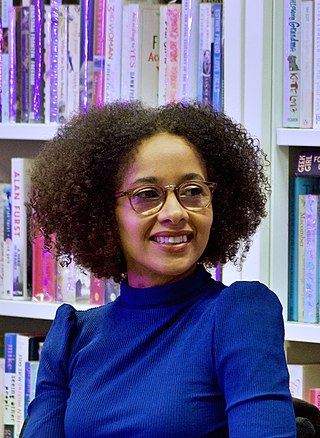
Diana Omo Evans FRSL is a British novelist, journalist and critic who was born and lives in London. Evans has written four full-length novels. Her first novel, 26a, published in 2005, won the Orange Award for New Writers, the Betty Trask Award and the deciBel Writer of the Year award. Her third novel Ordinary People was shortlisted for the 2019 Women's Prize for Fiction and won the 2019 South Bank Sky Arts Award for Literature. A House for Alice was published in 2023.

Ottessa Charlotte Moshfegh is an American author and novelist. Her debut novel, Eileen (2015), won the Hemingway Foundation/PEN Award, was shortlisted for the Booker Prize, and was a fiction finalist for the National Book Critics Circle Award. Moshfegh's subsequent novels include My Year of Rest and Relaxation, Death in Her Hands, and Lapvona.
Sara Baume is an Irish novelist. She was named on Granta magazine's "Best of Young British Novelists" list 2023.

Sally Rooney is an Irish author and screenwriter. She has published three novels: Conversations with Friends (2017), Normal People (2018), and Beautiful World, Where Are You (2021). The first two were adapted into the television miniseries Normal People (2020) and Conversations with Friends (2022).
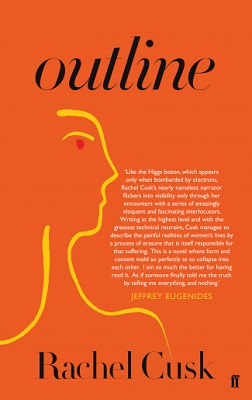
Outline is a novel by Rachel Cusk, the first in a trilogy known as The Outline trilogy, which also contains the novels Transit and Kudos. It was chosen by The New York Times critics as one of the 15 remarkable books by women that are "shaping the way we read and write fiction in the 21st century." The New Yorker has called the novel "autobiographical fiction."

Dept. of Speculation is a 2014 novel by American author Jenny Offill. The novel received positive reviews, and has been compared to Offill's later work, Weather.

Second Place is a 2021 novel by Rachel Cusk.

Pure Colour is a novel by Canadian author Sheila Heti. Published by Knopf Canada, the book won the 2022 Governor General's Literary Award for English-language fiction.
References
- 1 2 3 4 5 6 Barber, Lynn (30 August 2009). "Rachel Cusk: A fine contempt". The Observer . Retrieved 23 April 2019.
- ↑ Bethune, Brian (26 October 2015). "Rachel Cusk: 'On a winding road in the dark'". Maclean's . Retrieved 8 October 2021.
- 1 2 3 Kellaway, Kate (24 August 2014). "Rachel Cusk: 'Aftermath was creative death. I was heading into total silence'". The Observer. Retrieved 23 April 2019.
- ↑ Heti, Sheila. "The Art of Fiction No. 246". The Paris Review: 35–63.
- 1 2 3 4 Thurman, Judith (31 July 2017). "Rachel Cusk Gut-Renovates the Novel". The New Yorker. Retrieved 28 April 2021.
- ↑ Garan Holcombe (2013), Rachel Cusk: Critical perspective, British Council , retrieved 29 December 2016
- ↑ "The Country Life", Publishers Weekly , 4 January 1999, retrieved 29 December 2016
- ↑ "Fiction Book Review: THE LUCKY ONES by Rachel Cusk, Author". Publishers Weekly . 26 January 2004. Retrieved 12 May 2021.
- ↑ "Granta list of Best Young British Novelists". 2003.
- ↑ Cusk, Rachel (21 March 2008). "I Was Only Being Honest". The Guardian. Retrieved 23 April 2019.
- ↑ "Rachel Cusk". Poets & Writers. 19 June 2018. Retrieved 9 June 2020.
- ↑ Blair, Elaine (5 January 2015). "All Told". The New Yorker. Retrieved 26 December 2018.
- ↑ Lasdun, James (3 September 2014). "Outline by Rachel Cusk review – vignettes from a writing workshop". The Guardian. ISSN 0261-3077 . Retrieved 26 December 2018.
- ↑ "The 10 Best Books of 2015". The New York Times. 3 December 2015. Retrieved 23 April 2019.
- ↑ Julavits, Heidi (11 January 2015). "Rachel Cusk's Outline". The New York Times. Retrieved 28 April 2022.
- ↑ "The Folio Prize announces 2015 shortlist". The Folio Prize. Retrieved 25 January 2016.
- ↑ Flood, Alison (1 October 2014). "Goldsmiths book prize shortlist includes crowd-funded first novel". The Guardian. ISSN 0261-3077 . Retrieved 25 January 2016.
- ↑ Flood, Alison (13 April 2015). "Baileys women's prize for fiction shortlists debut alongside star names". The Guardian. ISSN 0261-3077 . Retrieved 25 January 2016.
- ↑ Dunmore, Helen (28 August 2016). "Transit by Rachel Cusk – a woman's struggle to rebuild her life". The Guardian.
- ↑ Garner, Dwight (17 January 2017). "Rachel Cusk's Transit Offers Transcendent Reflections". The New York Times. Retrieved 21 May 2018.
- ↑ Smee, Sebastian (29 May 2018). "With Kudos, Rachel Cusk completes a literary masterpiece". The Washington Post. ISSN 0190-8286 . Retrieved 30 May 2018.
- ↑ Garner, Dwight (21 May 2018). "With Kudos, Rachel Cusk Completes an Exceptional Trilogy". The New York Times. ISSN 0362-4331 . Retrieved 30 May 2018.
- ↑ Waldman, Katy (22 May 2018). "Kudos, the Final Volume of Rachel Cusk's "Faye" Trilogy, Completes an Ambitious Act of Refusal". The New Yorker. Retrieved 30 May 2018.
- ↑ "Rachel Cusk interview: 'Medea is about divorce … A couple fighting is an eternal predicament. Love turning to hate'". The Guardian. 3 October 2015. Retrieved 18 February 2022.
- ↑ "Medea, Almeida Theatre, London — review" . Financial Times. 4 October 2015. Retrieved 18 February 2022.
- ↑ "Los Angeles Review of Books". Los Angeles Review of Books. 10 May 2021. Retrieved 22 October 2021.
- ↑ "Where Life Ends and Art Begins: On Rachel Cusk's "Second Place"". Cleveland Review of Books. Retrieved 2 December 2021.
- ↑ Flood, Alison (26 July 2021). "Booker prize reveals globe-spanning longlist of 'engrossing stories'". The Guardian . Retrieved 4 October 2021.
- 1 2 "Ivan Coyote, David A. Robertson & Julie Flett among finalists for $25K Governor General's Literary Awards". CBC Books, October 14, 2021.
- ↑ Dupuy, Éric (7 November 2022). "Claudie Hunzinger, Rachel Cusk et Annette Wieviorka primées au Femina 2022". Livres Hebdo (in French). Retrieved 8 November 2022.
- ↑ Cusk, Rachel (17 February 2012). "Rachel Cusk: my broken marriage". The Guardian. Retrieved 23 April 2019.
- ↑ Carponen, Claire. "The $2.7 Million English Coastal Home Of Author Rachel Cusk Hits The Market". Forbes. Retrieved 15 March 2021.
- ↑ "Rachel Cusk's house is an austere, experimental, hyper-modern masterpiece. (Shocking, right?)". Literary Hub. 28 August 2019. Retrieved 15 March 2021.
- ↑ "Rachel Cusk won't stay still". Atlantic. 24 October 2022.
- ↑ Hitchens, Antonia (4 May 2021). "Rachel Cusk's 'Second Place' Might Be the First Pandemic Novel". The Wall Street Journal . Retrieved 8 October 2021.
- ↑ Laing, Olivia (24 January 2009). "Review of The Last Supper: A Summer in Italy by Rachel Cusk". The Guardian.
- ↑ Begley, Adam (28 May 2009). "Review of The Last Supper: A Summer in Italy by Rachel Cusk". The New York Times.
- ↑ "C38 Quarry". Sylph Editions. April 2022. Retrieved 3 March 2024.
- ↑ ""After Caravaggio's Sacrifice of Isaac," by Rachel Cusk". Granta. 14 April 2003. Retrieved 9 February 2024.
- ↑ Cusk, Rachel (17 April 2023). ""The Stuntman," by Rachel Cusk". The New Yorker. Retrieved 27 June 2023.
- ↑ "Whitbread Winners 1971-2005" (PDF). Costa Book Awards. Retrieved 29 January 2017.
- ↑ "Previous winners of the Somerset Maugham Awards". The Society of Authors . Retrieved 29 December 2016.
- ↑ "Whitbread 2003 shortlists". The Daily Telegraph. 10 November 2003. Retrieved 5 March 2017.
- ↑ "In the Fold". The Man Booker Prizes. September 2005. Retrieved 30 December 2016.
- ↑ "2007 Shortlist". Women's Prize for Fiction. Retrieved 18 May 2021.
- ↑ "The Scotiabank Giller Prize Presents Its 2015 Shortlist". Scotiabank Giller Prize. Canada. 5 October 2015. Retrieved 5 March 2017.
- ↑ "The Scotiabank Giller Prize Presents Its 2017 Shortlist". Scotiabank Giller Prize. Canada. 2 October 2017. Retrieved 2 October 2017.
- ↑ Gatti, Tom (26 September 2018). "Rachel Cusk makes Goldsmiths Prize shortlist for the third time". New Statesman. Retrieved 23 April 2019.
- ↑ Dupuy, Éric (7 November 2022). "Claudie Hunzinger, Rachel Cusk et Annette Wieviorka primées au Femina 2022". Livres Hebdo (in French). Retrieved 8 November 2022.